This summer, we were excited to have Isaac Stuber Li, Nicky Anderton, Christopher Lam, Chirag Naik, and Ivy Charles as our 2025 Apprentice Directors!
With the support of the RBC Emerging Artists Program, Bard’s Apprentice Directors Program invites emerging and early-career directors into our rehearsal halls to work alongside our Season’s directors and support the development of our productions.
This month, we caught up with Isaac, Nicky, Christopher, Chirag, and Ivy to chat about their time as Apprentice Directors, what they’ve learned from their experience, and where they’ve been finding inspiration these days. Read on to learn more!
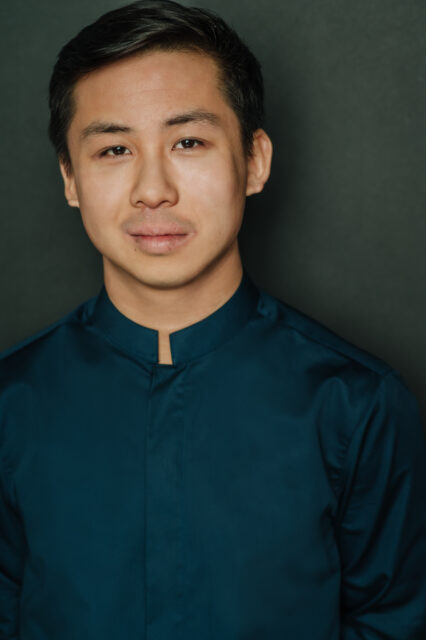
Isaac Stuber Li, Much Ado About Nothing
Can you tell us a bit about yourself and what first drew you towards directing?
I’m a Chinese Canadian director and actor based in Vancouver. I love this city, in all its multicultural vibrancy, and that often shows up in my work and in my taste. I remember doing shows as a teenager, thinking about how I would best convey an element in the play, and perhaps egotistically thinking my ideas were better. It’s been a balancing act since then, figuring out how to herald my vision, while making collaborative space for others. I’ve always been the type of person to lead the charge, whether that was running a poetry club in high school, or bringing people together to start a theatre company, and so the idea of directing always fascinated me, and challenged the way I think about leadership. It’s a role that constantly asks me to merge imagination, empathy, and teamwork.
Is there one moment or lesson that stands out to you from your experience as an Apprentice Director on Much Ado About Nothing?
One moment that stands out was watching how small adjustments in staging could unlock entirely new layers of meaning in a scene. During rehearsals, I observed Johnna [Wright] making a subtle shift in the physical distance between two characters, and suddenly the tension, humor, and vulnerability of the moment came alive in a way I hadn’t anticipated. Johnna’s collaborative method and deeply experienced vision-casting was a dream to observe. Dare I say I want to be like her when I grow up. I do want to add that getting to be an Apprentice Director at Bard was also a masterclass in acting, as I got to watch some of the best actors in this city work in the rehearsal hall. I got to watch them explore, play, and perhaps most valuably, I got to watch them make mistakes and learn from them. The combination of artistry and generosity in that rehearsal hall made the whole experience an unequivocal 10/10.
How would you describe this production of Much Ado About Nothing?
This Much Ado About Nothing is like a perfect summer cocktail: bright, fizzy, and just a little bittersweet, but with an extra kick thanks to Erin Shields’ added text. Her writing gave the women more space to speak with modern clarity about the pressures and double standards they face, adding depth and bite beneath all the music, dance, and banter. It sharpened the stakes and made the world feel timeless and fresh all at once. Shakespeare with a twinkle in its eye and something important to say.
Where have you been finding inspiration lately?
Through many things. As simple as unplugging on the bus and listening to what strangers are saying (or not saying) to each other. As complicated as diving into the process of decolonizing my spirit and learning about my Chinese culture and heritage. Through the media I take in: children’s cartoons, indie films, high fantasy novels, and comic books. And my own stories of growing up in my own context, investigating moments of brokenness and glory in my past.
___
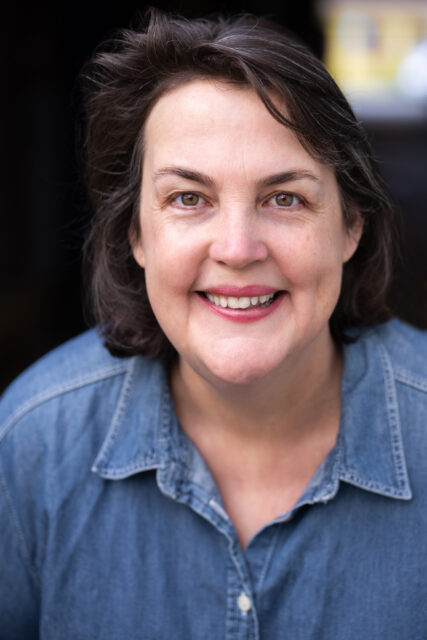
Nicky Anderton, The Two Gentlemen of Verona
Can you tell us a bit about yourself and what first drew you towards directing?
My love story with theatre began in my early years growing up in Malawi. My parents were involved in community theatre, so I spent much of my childhood watching theatre and being part of a community of storytellers. In my early teen years I moved to South Africa, a country that was in the thick of apartheid and deep civil unrest. There was an incredible theatre called the Market Theatre where audience members of all races could gather, and it felt like a profound relief to finally witness a portal into the truth about how people were living and feeling. I’ve never lost that feeling. Theatre can be an astonishing means by which we can be awakened to a consciousness, dialogue, reckoning, and awareness within our community. After completing my actor training in San Francisco, I started experimenting with devised theatre and loved it! It felt exciting to tell stories that felt important and truthful. As a society, I feel like we’re more disconnected than ever and theatre offers us the opportunity to gather and look into the reflection of the pond in a strange and beautiful community ritual.
Is there one moment or lesson that stands out to you from your experience as an Apprentice Director on The Two Gentlemen of Verona?
It was a privilege and dream come true to get to work with Dean Paul Gibson on this production of The Two Gentlemen of Verona! A masterclass in directing and Shakespeare. Dean’s vision, generosity, vitality, care, and humour are invigorating. He seemed to genuinely delight in the company of actors and designers, and I think that laughter translated to the stage as well. I hope to bring that sense of playfulness into future projects. I had a front seat to the entire process and had many conversations with the company of actors and designers, who were so generous in sharing their process, perspectives, and insights. I learned so much. This was also my first experience working in repertory and it was remarkable to watch the company navigate both plays with so much talent, good humour, and grace. And the setting of this festival is truly splendid!
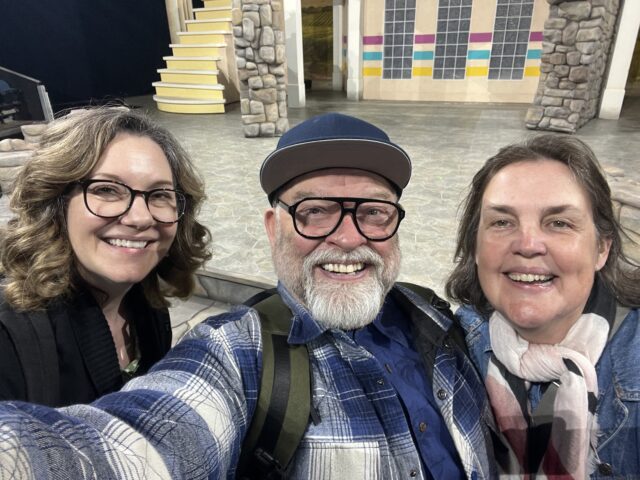
Nicky Anderton with Alison Matthews (Head Voice & Text Coach) and director Dean Paul Gibson.
How would you describe this production of The Two Gentlemen of Verona?
Fun, energetic, youthful, engaging, touching, neon, complex, an ‘80s dance party, and a total blast!
Where have you been finding inspiration lately?
I recently returned from a family trip to Montréal, Quebec City, and Ottawa, and I loved exploring more of this beautiful country. I enjoy reading new plays and spending time with my friends and family. I’m always inspired by the genius, talent, and vision of Carrie Tennant, Artistic Director of the Vancouver Youth Choir, for building a community of singers and artists who sing with so much heart and joy!
___
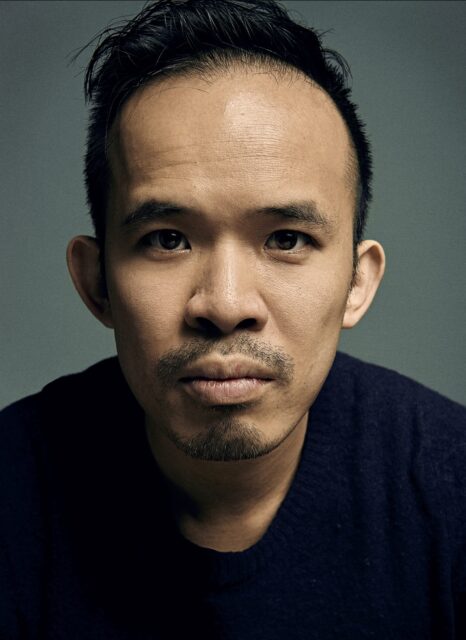
Christopher Lam, The Two Gentlemen of Verona
Can you tell us a bit about yourself and what first drew you towards directing?
I’m a second-generation Chinese Canadian, born and raised in Vancouver. Directing came about after my last year of acting school. During this time I was already writing, and I knew I had an impulse for direction because I usually thought a lot about the grand scheme of storytelling, and one of the key elements in my process is obsessing over images, thinking through composition and embracing my collaborators’ personal language. I dabbled in every facet of theatre-making (sound design, set design, and stage management) and acting professionally for many years, but my practice is still evolving, responding to cultural shifts, asking questions about art, and exploring my curiosities.
Is there one moment or lesson that stands out to you from your experience as an Apprentice Director on The Two Gentlemen of Verona?
It’s watching Dean at work. I think Dean is very attuned to the actor’s process, which is why he is very sympathetic to their individual journeys, but also, he loves rigour, and without that discipline I don’t think the group I witnessed would have had the level of work ethic and fun if he didn’t instil both those values.
This group really loves each other, and it was like walking into a summer drama camp. It was very irreverent and downright shameless, full stop. Folks love what they do, having fun, and just sinking their teeth into this work.
How would you describe this production of The Two Gentlemen of Verona?
The synthesis of high concept, nostalgia, and energy. Dean gives us a tour of the ‘80s—all the bombast, excess, self-agenda, capitalism, index of pop culture, and consequence of love and betrayal. The design has been stellar because it goes for accuracy in terms of the sights and sounds of the ‘80s aesthetic.
Where have you been finding inspiration lately?
I would say that I’m watching a lot of weird Czech dark puppetry movies right now.
___

Chirag Naik, The Complete Works of William Shakespeare (abridged) [revised] [again]
Can you tell us a bit about yourself and what first drew you towards directing?
I’m a South Asian Canadian who grew up in Calgary before spending time in Montréal and ending up here in Vancouver. It’s inspiring to work and travel the country discovering the artistic communities across our beautiful country! While I will probably always consider myself an actor first, I love directing for its capability to craft a more specific tailored story for an audience. It was about 7 or 8 years ago that company member Scott Bellis dropped the seed of direction into my mind. He said as an actor, his eye was starting to identify different interpretations to shows that he would find himself involved in. A few years back I noticed my mind was doing something similar and I began to consider how to train my director’s brain more particularly.
Is there one moment or lesson that stands out to you from your experience as an Apprentice Director on The Complete Works of William Shakespeare (abridged) [revised] [again]?
There’s more than a few I could mention! This was a show that had so many different renditions on a day-to-day basis. That’s partly because the script changed almost every day! I think when I imagined directing, I thought I might be working from a solid set script and treating it like my bible. This show was an amazing lesson in adaptability and fluidity in creation across all aspects. If the script can change so vastly, what other possibilities open up? Often as an actor I think, “how I can honour the script?” but this experience modified that to “how can I best serve the show?” Our director Mark Chavez is a comedy genius with an open mind and watching him rebuild this script like a wiggly wacky (and wildly fun) Frankenstein’s monster was incredible.
How would you describe this production of The Complete Works of William Shakespeare (abridged) [revised] [again]?
Thrillingly fun and stylistically rich. Not only that, but it’s a show that everyone will enjoy. Are you a super fan of Shakespeare? This is for you. Do you think Shakespeare is a bit heady and difficult to grasp? This show is for you. Are you a fan of Hallmark movies? Or maybe more into CSI style shows? Well either way, this show is for you.
Where have you been finding inspiration lately?
This might sound tacky but my dog. She’s a little angel and she teaches me the gift of living in the moment every single day. There’s so much to be grateful for and every opportunity we have to soak it up is a blessing.
___
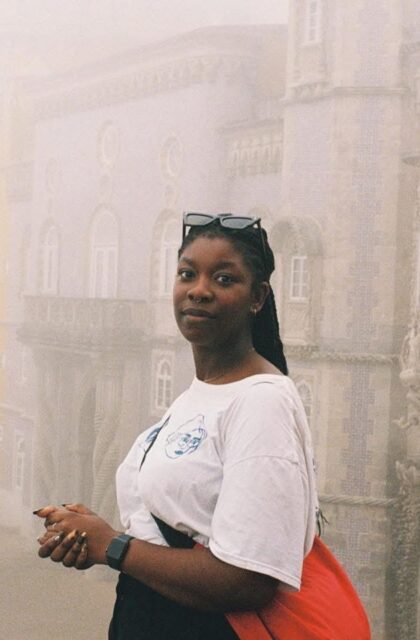
Ivy Charles, The Dark Lady
Can you tell us a bit about yourself and what first drew you towards directing?
Growing up, I was often on stage as a dancer. I never really considered what it might be like to stay involved in performance after I stopped competing at 17. Four years later, in the fall of 2017, I moved from Winnipeg to Vancouver to attend theatre school at Studio 58. The COVID-19 pandemic abruptly ended my studies, including the directing course I had enrolled in. For that course, we used Henrik Ibsen’s A Doll’s House as our material and were asked to come up with ideas for production design and casting. I found myself completely wrapped up in the process. Wanting to collaborate, share ideas, and expand on them. I’ve found that when the values of a story align with my own, I don’t tire of the idea of directing it.
Is there one moment or lesson that stands out to you from your experience as an Apprentice Director on The Dark Lady?
At our first table read, I was completely enamoured with the team. Moya and I had a few meetings before rehearsals began—we talked about the vision for the piece, goals, images, themes, and more. Hearing the production team speak about their designs, I knew immediately that everyone was on the same page. And when the actors read the words aloud in front of others for the first time, the energy in the room was magnetic. What amazed me most is that the feeling of togetherness and teamwork I felt on that first day never left throughout the rehearsal process. I learned a lot about communication and leadership from Moya.
How would you describe this production of The Dark Lady?
Profound, sexy, and deeply moving.
Where have you been finding inspiration lately?
In nature. There’s something special about a Vancouver summer—the salty ocean air, the sunsets, and mountain view—that makes me feel content and ready to keep going.
A huge thank you to Isaac, Nicky, Christopher, Chirag, and Ivy for taking the time to chat with us! It’s been a joy to have you as part of the Company, and we can’t wait to see where your journeys take you next.
To see some of the great work that our Apprentice Directors have done this summer, be sure to catch our 2025 Season productions, on now until September 20. Get your tickets by visiting our Season Schedule!
Bard on the Beach’s Apprentice Director Program is generously supported by the RBC Emerging Artists Program.

